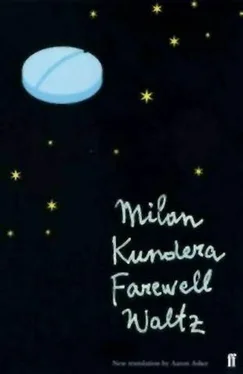Finally they went to the movie theater. Klima drew some comfort from the sight of the hero on the screen escaping treacherous dangers with infectious self-assurance. He imagined himself in the hero's shoes and now and then felt that persuading Ruzena to have an abortion would be a trifle that could be accomplished in a flash, thanks to his charm and his lucky star.
Later they lay side by side in the big bed. He looked at her. She was on her back, her head sunk into the pillow, her chin slightly raised, her eyes fixed on the ceiling, and in her body's extreme tension (it had always made him think of a violin, and he would tell her she had "the soul of a taut string") he suddenly experienced, in a single instant, her entire essence. Yes, it sometimes hap-
pened (these were miraculous moments) that he could suddenly grasp, in a single one of her gestures or movements, the entire history of her body and soul. These were moments of absolute clairvoyance but also of absolute emotion; for the woman who had loved him when he was still a nobody, who had been ready to sacrifice everything for him, who so understood his thoughts that he could talk to her about Armstrong or Stravinsky, about trivial and serious things, she was closer to him than any other human being… Then he imagined that this lovely body, this lovely face, was dead, and he felt he would be unable to survive her by a single day. He knew that he was capable of protecting her to his last breath, that he was capable of giving his life for her.
But this stifling sensation of love was merely a feeble fleeting glimmer, because his mind was wholly preoccupied by anxiety and fear. He lay beside Kamila, he knew he loved her boundlessly, but he was absent mentally. He caressed her face as if he were caressing it from an immeasurable distance some hundreds of kilometers away.
It was about nine in the morning in the spa town when an elegant white sedan pulled up in the parking lot at the edge of the spa proper (automobiles were not permitted any farther) and Klima stepped out of it.
Running through the spa was a long, narrow park with scattered clusters of trees, sand paths, and colorful benches on the lawn. Along both sides of the park stood the thermal center's buildings, among them Karl Marx House, where the trumpeter had spent a couple of fateful hours one night in Nurse Ruzena's little room. Facing Karl Marx House on the other side of the park was the spa's most handsome structure, a building in the turn-of-the-century art nouveau style covered with stucco embellishments and with broad steps leading up to the entrance and a mosaic over it. It alone had been accorded the privilege of keeping its original name: Hotel Richmond.
"Is Mister Rertlef still staying here?" Klima asked at the desk, and, receiving an affirmative reply, he ran up the red-carpeted stairs to the second floor and knocked at a door.
Upon entering he saw Bertlef, who came to meet him in his pajamas. Embarrassed, Klima started to apolo-
gize for his unexpected visit, but Bertlef interrupted: "My friend! Don't apologize! You are giving me the greatest pleasure I have ever had here so early in the day."
He gripped Klima's hand and went on: "In this country people don't respect the morning. An alarm clock violently wakes them up, shatters their sleep like the blow of an ax, and they immediately surrender themselves to deadly haste. Can you tell me what kind of day can follow a beginning of such violence? What happens to people whose alarm clock daily gives them a small electric shock? Each day they become more used to violence and less used to pleasure. Believe me, it is the mornings that determine a man's character."
Bertlef took Klima gently by the shoulder, steered him to an armchair, and went on: "And to think that I so love those morning hours of idleness when, as if over a bridge lined with statues, I slowly go across from night to day, from sleep to awakened life. This is the time of day when I would be so very grateful for a small miracle, for an unexpected encounter that would convince me that my nocturnal dreams are continuing, that no chasm separates the adventures of sleep from the adventures of the day."
As the trumpeter watched Bertlef pacing up and down the room in his pajamas and smoothing his graying hair with his hand, he heard in the sonorous voice an ineradicable American accent and something charmingly outdated about his vocabulary, which was easily explained by Bertlef's never having lived here in
his family's country of origin and having learned its language only from his parents.
"And no one, my friend," he now explained, leaning over Klima with a confiding smile, "no one in this entire spa understands me. Even the nurses, who are otherwise quite obliging, look indignant when I invite them to share a bit of pleasant time with me during breakfast, so I must postpone such appointments until the evening, when I am really a little tired."
Then he went over to a small telephone table and asked: "When did you arrive?"
"This morning," said Klima. "I drove."
"You are surely hungry," said Bertlef, and he picked up the receiver. He ordered two breakfasts: "Four poached eggs, cheese, butter, rolls, milk, ham, and tea."
Meanwhile Klima scrutinized the room. A large round table, chairs, an armchair, a mirror, two couches, and doors leading to the bathroom and, he remembered, to Bertlef's small bedroom. Here in this luxurious suite was where it had all started. Here had sat the tipsy musicians of his band, for whose pleasure the rich American had invited some nurses.
"Yes," said Bertlef, "the picture you are looking at was not here before."
It was only then that the trumpeter noticed a canvas showing a bearded man with a strange, pale-blue disk behind his head and holding a paintbrush and a palette. The picture seemed ineptly done, but the trumpeter knew that many seemingly inept pictures were famous works of art.
"Who painted that?"
"I did," replied Bertlef.
"I didn't know you painted."
"I love to paint."
"And who is this?" the trumpeter was emboldened to ask.
"Saint Lazarus."
"What do you mean? Was Lazarus a painter?"
"This is not the Lazarus in the Bible, but Saint Lazarus, a monk who lived in the ninth century in Constantinople. He is my patron saint."
"Really!" said the trumpeter.
"He was a very odd saint. He was not martyred by pagans because he believed in Christ, but by wicked Christians because he loved painting too much. As you may know, in the eighth and ninth centuries the Greek Orthodox Church fell prey to a rigorous asceticism intolerant of all worldly joys. Even paintings and statues were considered objects of impious pleasure. The emperor Theophilus ordered thousands of beautiful paintings destroyed and prohibited my cherished Lazarus from painting. But Lazarus knew that his paintings glorified God, and he refused to yield. Theophilus threw him into prison, had him tortured, demanded that Lazarus give up painting, but God was merciful and gave him the strength to bear cruel ordeals."
"That's a beautiful story," said the trumpeter politely.
"A magnificent one. But surely it was not to look at
my paintings that you came here to see me."
Just then there was a knock at the door, and a waiter came in with a large tray. He set it on the table and laid out breakfast for the two men.
Bertlef asked the trumpeter to sit down at the table and said: "This breakfast is not remarkable enough to keep us from continuing our conversation. Tell me, what is on your mind?"
And so, as he chewed, the trumpeter told of his misfortune, prompting Bertlef at various points of the story to come up with penetrating questions.
He wanted above all to know why Klima had not answered the nurse's two postcards, why he had not taken her telephone calls, and why he had never made a single friendly gesture that might have prolonged their night of love with a quiet, calming echo.
Читать дальше










